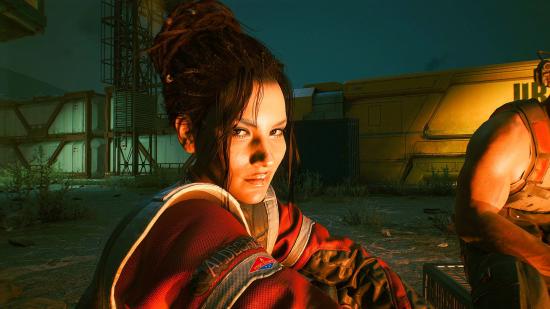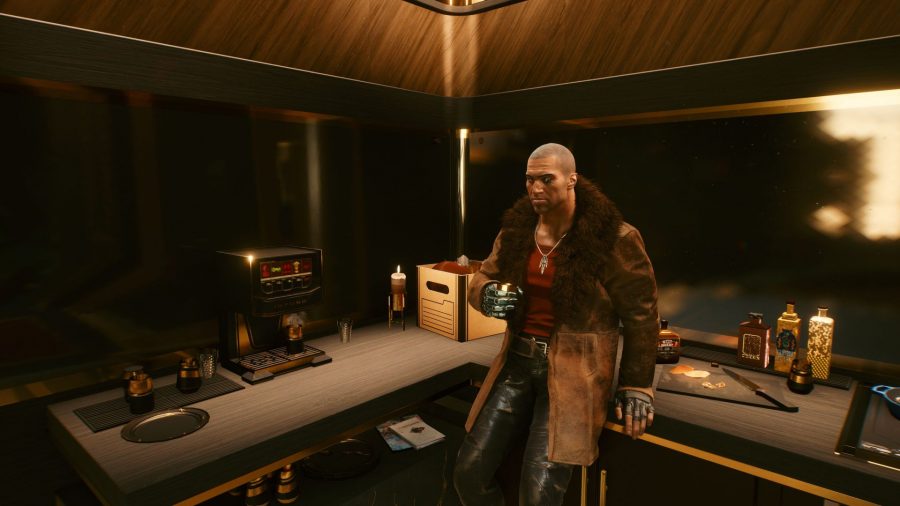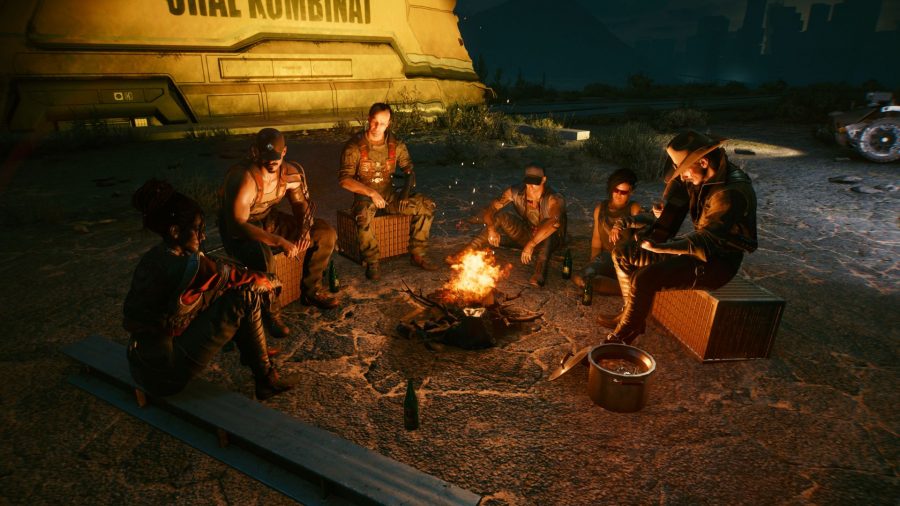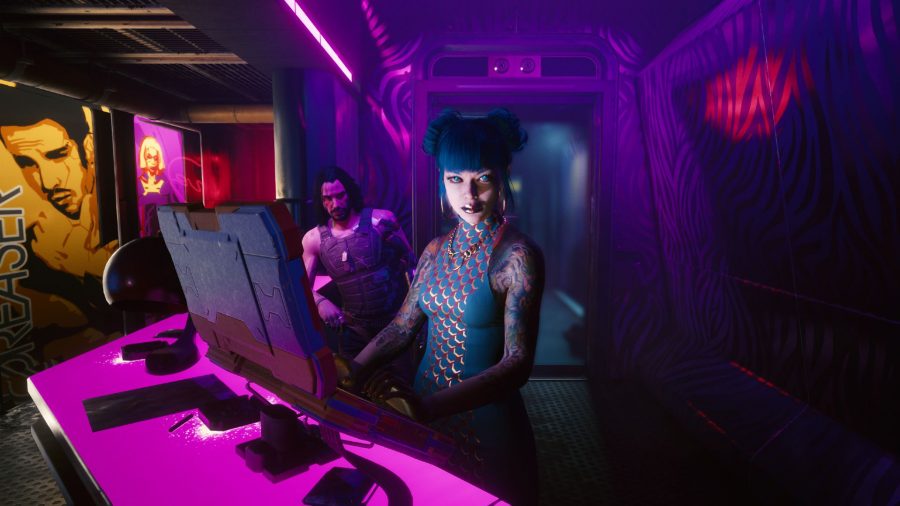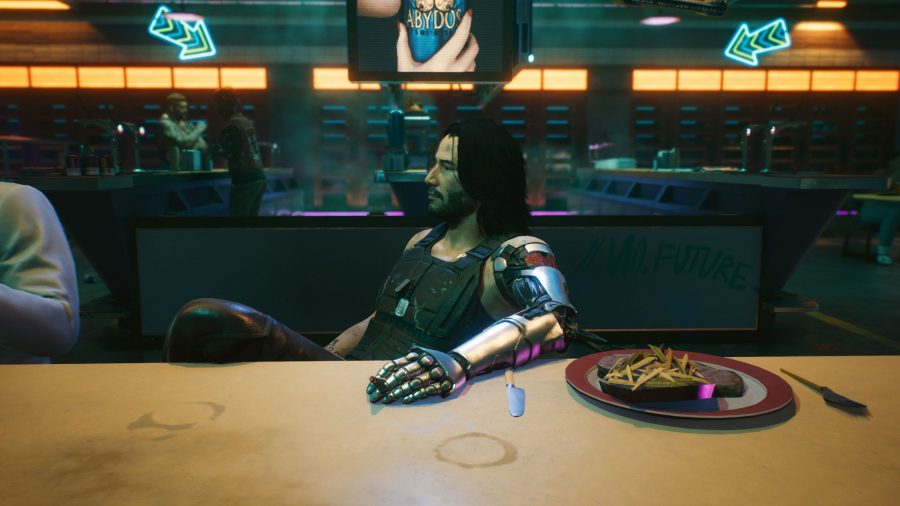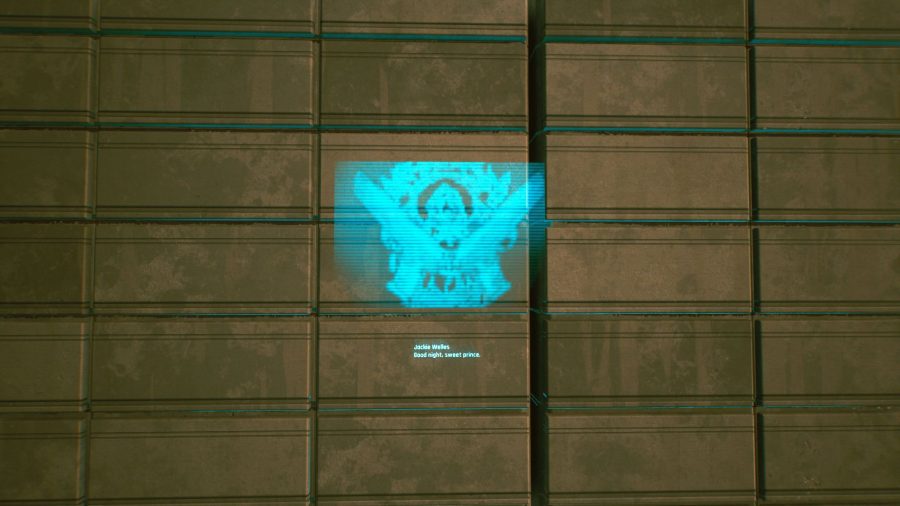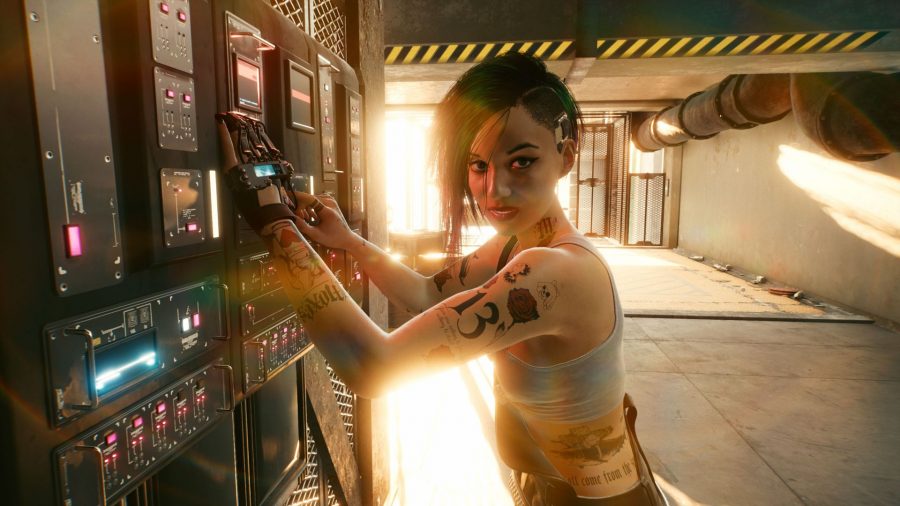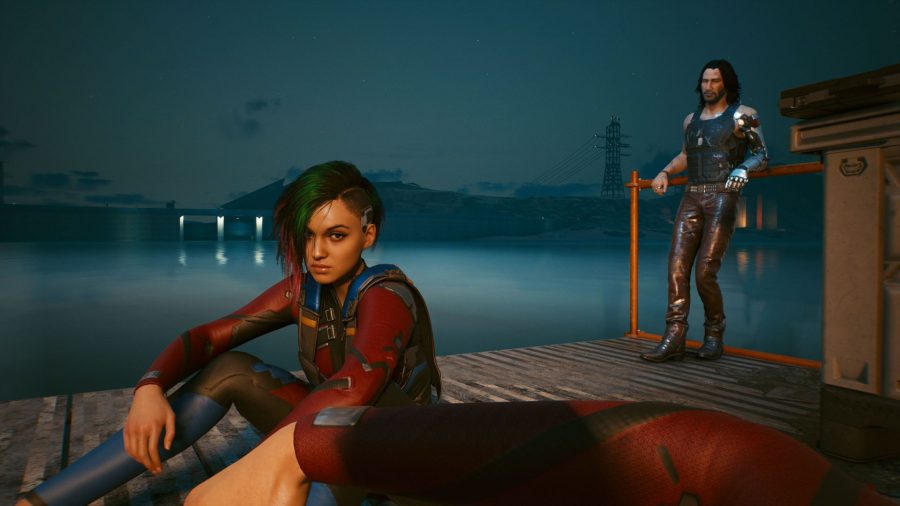The bright neon lights of Cyberpunk 2077’s Night City twinkle invitingly as you gaze at it from the craggy desert hills of the Badlands, but as you approach it and it begins to surround and swallow you, the lights fade and you find yourself in the grime and sweat below. CD Projekt Red’s sprawling and troubled RPG game may have made its share of missteps – the aggressive marketing campaign and buggy launch perhaps chief among them – but it gets a lot of things right, too.
One area where Cyberpunk 2077 – which you can buy here, coincidentally – really shines is in its cast of characters. The people V meets in the streets of Santo Domingo and the dusty desert trails of the Badlands are complex and layered, often brought to life by masterful vocal performances and animation. In keeping with the finer traditions of the cyberpunk genre, these characters can rarely be understood as being either good or bad – far more often, they’re desperate people trying to navigate a world full of bad options.
Here’s news editor Carrie Talbot and senior news writer Ian Boudreau, talking about Cyberpunk 2077’s dramatis personae – who these people are, and why they’re so appealing… even if they make you hate them sometimes.
Oh, and there will be major plot spoilers ahead. You have been warned.
Carrie Talbot: Well, I don’t know about you, Ian, but Cyberpunk 2077’s endings had me yelling at several of its best characters. No matter which path I took, I wound up confronting complexities and disappointments I wasn’t expecting. Take ex-cop River Ward, for example. He’s an intriguing guy to encounter in a place like Night City: stable, (mostly) morally upright, emotionally intelligent, and charismatic. I saw the flip side of these seemingly great attributes in the epilogue, where it’s revealed that River stays in Night City – a town that cares for him about as little as he cares for it – with his family rather than carving out his own path into the unknown alongside V; a fate he seemed to want for himself.
It’s a similar story with the smart, strong, and dazzlingly personable Judy Álvarez. After gently turning her down she bolts, leaving V to face their imminent demise alone, eventually flinging over a video message to show V the wonders she’d escaped to. Some volatile emails from a past relationship you can read on a laptop in Maiko’s office reveal yet another side of Judy’s personality – even if we’d ridden off into the sunset together I’d have to accept that there’s a toxic side to Judy.
In both situations, despite picking what felt like sensible, moral options, I didn’t get what I had hoped for when the credits rolled. The train tracks of their paths didn’t automatically converge with mine just because I was the protagonist of this RPG.
Or at least that’s what I thought I wanted from these romances. What I really want is for Night City to be full of complex people with their own agendas, wants, and needs, independent of those I choose for V. And that’s what we get, isn’t it?
Ian Boudreau: It really is, and I think that might secretly be the thing that makes Cyberpunk 2077 a genuinely brilliant RPG. CD Projekt Red is no stranger to morally compromised characters – The Witcher series is full of them – and the cyberpunk genre is nothing if not an exploration of what compromises do to people.
Cyberpunk 2077’s characters have all had to make sacrifices just to get by in the corpo controlled world of Night City. In my playthrough, I followed the romance storyline with Panam Palmer, who initially comes across as a fiercely independent free agent, someone who has figured out a way to really be herself. But it quickly becomes clear that her approach to life is the result of a family dispute with her clan, the Aldecaldos, rather than a freely taken decision. What she really wants is to reunite with the clan and find acceptance there, and it turns out she can be a bit of a jerk. Eventually you realise exactly why Panam has such a tough time getting along with people, although you’ll probably wind up liking her a lot by then.
The best example is the relationship that develops between V and Johnny Silverhand. Compromise is exactly the thing that set Johnny off on the path of self-annihilating rage, and Cyberpunk 2077 helps you understand his motivations by dropping you into his perspective for some key sequences. He’s standoffish and often mean, but – and here I think we need to give credit to Keanu Reeves’ weirdly inherent charisma – he’s also kind of irresistible. There’s an exchange in Clouds where Johnny makes some snide, cutting remark about the choice of braindance partners offered to V, and they shoot back with a simple, “Eat a dick, Johnny.”
 Cyberpunk 2077 Cyberpunk 2077 $59.99 Buy now Network N earns affiliate commission from qualifying sales.
Cyberpunk 2077 Cyberpunk 2077 $59.99 Buy now Network N earns affiliate commission from qualifying sales.
It’s hard to nail down exactly why, but to me that feels like such a genuine, human response – the kind you’d make to someone you often can’t stand, who you’re frequently at odds with, but who you’ve also grown to love in some way, perhaps because you’ve never really had another choice in the matter.
CT: That’s such an important point, and I totally agree. Each character, romanceable or otherwise, has compromise hardwired into them. They’re all jerks at some point or another, and that really draws me to them because it makes them more human. And that’s key in a city where humanity’s a rare commodity.
The glimpses I got of Judy’s irascibility made me carefully consider how I should navigate my fledgling friendship with her. Should I back her up and let the Moxes declare their independence, even if it feels like the wrong choice? Or should I let a vicious, determined yuppie take Clouds over and steer the ship with a more seasoned hand? Pick the latter and Judy will be pretty pissed – she’ll challenge you, and she can be immature and unreasonable about it. Her knee-jerk reaction had my stomach gnawing itself up for a bit.
The result is that every interaction feels rich. You’ll question yourself; evaluate your options; get fired up and defensive about your choices. Heck, on a few separate occasions I Googled whether or not I’d made the ‘wrong’ choice only to find that I hadn’t – and Judy comes to realise that, too. There’s no perfect answer. I want to be right, of course, but I also want her to see that. It means a lot to me that she does. Ultimately, it makes me treat her more like a person, not an archetypal RPG character.
And then there’s Johnny. How does he become someone who can blow up a building and kill thousands of people? Can we identify with or care for him without compromising ourselves? There’s a flashback that shows an Arasaka techie talking about how her partner died in the explosion, and he says nothing until really pushed; he doesn’t even acknowledge her pain. He can be pretty awful.
Does his trajectory over the story make us empathetic because both he and V are growing from the experience of sharing headspace, or simply because they’re becoming an amalgam and can more easily find common ground? I often kicked myself for coming to care deeply about Johnny, because he doesn’t make it easy!
IB: He really doesn’t. Even when you know he’s right about something – and he is, more often than is comfortable – he’s just got to be a self-satisfied prick about it. But I think we’ve probably all known someone like that, someone whose arrogance and anger completely undercut any good points they might have to make.
The flip side of this, for me, is that I felt good when Johnny started showing V some respect after I’d stood up for myself a few times and the story had progressed. I hated this guy, but I realised that I had also been subconsciously seeking his approval, too. I wanted him to think V was good enough to help him fight his war on Arasaka and Night City – and when that dawned on me, it was a bit unnerving.
I’m sad we get so little time with Jackie Welles in Cyberpunk 2077, because he’s another case where the writing and performance disappear in an utterly convincing personality. V runs into Jackie early on, and they’re both young people in a big city trying hard to prove themselves, acting all cocky but constantly seeking each other’s reassurance, often in subtle little ways.
Jackie is gone all too soon, and he seemed as surprised as I was when it happened – it felt like we were both thinking it wasn’t supposed to go down this way. Jackie was wrong, he wasn’t destined to be one of the legends of Night City, and as I played further into the story it became clearer and clearer that he was never the kind of guy who could have survived the city – at least, not without changing who he was on a fundamental level. His love for his family and uncomplicated trust in his friends meant the place was always going to chew him up and spit him out – and that’s exactly what happened.
People aren’t good or bad in Cyberpunk 2077 and neither are the endings. Usually, they’re just endings.
CT: Absolutely! Jackie’s unwavering loyalty is a great foil for Cyberpunk’s more complicated, less easily lovable characters. A big part of me wishes that he stuck around for longer. I’d love to have seen the daring duo experience more together as young guns in a city of vice and opportunity. But his death really sets the stage for V’s story.
As for the game’s endings, they do a pretty good job of reminding us that in Night City, just getting to have your own say, your own sliver of self-determination, is a powerful win in itself. The game sticks to a core element of cyberpunk fiction, which is that the machine – the corpo-run world beyond any one individual’s sphere of control – is just too colossal to dent in any meaningful way. No one person can bring it down, not even Johnny with a nuclear bomb. And sometimes a situation like V’s health is basically hopeless.
What’s wonderful about Cyberpunk 2077’s untidy endings is that no matter what you choose you’re still choosing something. V can exercise their agency through the decision to survive, in whatever form that takes, venture out into the unknown, or even take their own life.
The ragtag gang of imperfect characters we meet enrich these decisions in wonderful and frustrating ways. We see the messages they’ve sent us during the epilogue, judging or reflecting on our decisions. You can’t please them all. It sucks to lose River and Judy, but my choices were the catalyst. It’s not the heroic finale you imagine for yourself at the end of an RPG, but in the end V never meant anything to Night City, and I love that CDPR had the courage to do that.
IB: Just getting by in Night City counts as a win, and I think Cyberpunk 2077’s characters understand that well. Even when you let someone down or make them angry with the decisions you make, they get it on some level. You had to do what you had to do, and ultimately the biggest sin is letting yourself trust someone else too much.
Everyone is in the process of realising this: that we’re all disempowered and alienated by the total control the corpos exert over Night City. Everyone and everything has been commodified and atomised, and moments of real connection with another person are ephemeral and fleeting.
It’s rare for a videogame to do this – to put you in a role where you’re not really a hero, and for other characters to recognise the fact that you’re probably just another disappointment waiting to happen. There are hints of this in The Witcher, but in the end, Geralt is a relatively traditional knight in shining armour, even if he grumbles and rolls his eyes about it a lot.
Like Case in William Gibson’s Neuromancer, V is “just another hustler, trying to make it through.” I think role-playing games have trained us for years to understand that we’re the solution to every problem, and it falls to Night City’s cast of supporting characters to show us that in Cyberpunk, we really aren’t. In all their brokenness and exhaustion and loneliness, I think they do a truly admirable job of that.
 Cyberpunk 2077 Cyberpunk 2077 $59.99 Buy now Network N earns affiliate commission from qualifying sales.
Cyberpunk 2077 Cyberpunk 2077 $59.99 Buy now Network N earns affiliate commission from qualifying sales.
